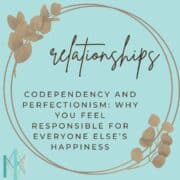
Many people struggling with codependency find themselves feeling anxious, overburdened, and emotionally drained by their relationships. They take on more than their fair share of responsibility, constantly trying to manage how others feel, anticipate needs, and prevent conflict. What many don’t realize is that perfectionism often plays a central role in this pattern—fueling an endless cycle of self-sacrifice, guilt, and the belief that their worth is tied to how much they do for others.
Perfectionism and codependency are deeply connected. Both involve setting unrealistically high standards for yourself, struggling with self-worth, and feeling responsible for making everything “right”—whether that means fixing problems, keeping people happy, or preventing emotional discomfort in those around you. This drive for perfection in relationships can make it even harder to set boundaries, say no, or allow others to take responsibility for themselves.
So why does perfectionism fuel codependency? And how can breaking free from these patterns help you build healthier relationships and a stronger sense of self? Let’s explore the connection—and the path to healing.
Learn more about codependency
What Is Perfectionism in Codependent Relationships?
Perfectionism in codependency isn’t about being “perfect” in the traditional sense—it’s about feeling like you must be everything for everyone, all the time. It’s a relentless internal pressure to:
- Anticipate and prevent other people’s struggles before they happen
- Always be emotionally available, no matter how drained you feel
- Make sure everyone around you is happy, even at your own expense
- Avoid conflict at all costs, believing that disharmony is a personal failure
- Feel competent and needed in relationships, even if it means overextending yourself
At its core, perfectionism in codependency is about control—the belief that if you just try hard enough, do enough, or give enough, you can prevent disappointment, rejection, or emotional pain in yourself and others.
Why Codependents Feel Responsible for Everyone Else’s Happiness
People struggling with codependency often develop deep-rooted beliefs that tell them they are responsible for making sure others feel safe, secure, and emotionally stable. These beliefs may come from childhood experiences, cultural conditioning, or past relationships, and they can be difficult to unlearn.
1. Early Conditioning: Learning That Love Is Conditional
Many codependents grew up in environments where love and approval were based on performance. If you were praised for being “helpful,” “mature,” or “selfless”—but shamed for having needs or expressing emotions—you may have learned that your worth comes from what you do for others rather than from who you are.
As a result, you may feel an internalized sense of guilt or fear when you prioritize your own needs. Instead, you default to “fixing” relationships by being overly accommodating, taking on responsibilities that aren’t yours, or working tirelessly to avoid disappointing others.
2. The Fear of Failure and Rejection
Perfectionism convinces you that mistakes or shortcomings make you unworthy of love. In codependency, this translates to relationships—if you don’t meet other people’s expectations, you may fear being abandoned, criticized, or seen as selfish.
This can show up as:
- Saying yes to things you don’t want to do because saying no feels like failure
- Avoiding difficult conversations to prevent conflict
- Over-apologizing, even when you haven’t done anything wrong
- Feeling immense guilt when you can’t “fix” someone’s emotions
3. Emotional Hyper-Awareness: Always Managing the Mood of Others
Codependent perfectionists often become hyper-attuned to the emotions of those around them, constantly scanning for signs of disappointment, frustration, or discomfort. You may feel compelled to jump in and soothe others before they even express a need for support, often at the cost of your own well-being.
This emotional monitoring can make relationships exhausting because you:
- Feel responsible for preventing other people’s distress
- Struggle to enjoy the present moment, always anticipating what could go wrong
- Experience high anxiety if someone seems upset, even when it has nothing to do with you
4. The “Invisible Contract” of Codependent Perfectionism
Many people with codependency hold an unspoken belief that if they give enough, do enough, and care enough, they will eventually receive the love and security they crave. This is an emotional contract that was never actually agreed upon by others—but it feels real, which is why it’s so painful when it doesn’t work.
The problem is that this mindset keeps codependents stuck in a cycle of over-functioning and resentment:
- You overextend yourself to prove your worth.
- Others begin to expect that level of effort from you.
- You feel unappreciated or unseen because your efforts go unnoticed.
- Instead of setting boundaries, you try even harder to earn love and validation.
This cycle is exhausting, unsustainable, and deeply unfair to you.
Breaking the Cycle: How to Heal from Codependent Perfectionism
FAQ about codependency therapy
Healing requires learning that your worth is not tied to how much you give, how well you manage other people’s emotions, or how perfectly you show up in relationships. Here’s where to start:
1. Challenge the Belief That You Must Earn Love
Your value does not come from what you do for others. Therapy can help you identify and challenge the early messages that made you believe love was conditional.
2. Stop Taking Responsibility for Other People’s Feelings
You are not responsible for managing the emotions of everyone around you. Learning to tolerate the discomfort of others being unhappy—without rushing in to fix it—is essential for healthy relationships.
3. Set Boundaries Without Guilt
Boundaries are not rejection or selfishness—they are necessary for balanced relationships. Start by setting small boundaries, such as saying no to tasks that drain you or taking time for yourself without explaining why.
4. Redefine Success in Relationships
Instead of measuring your worth by how much you do for others, start focusing on:
- How well you honor your own needs
- How comfortable you feel being authentic
- Whether your relationships feel mutually supportive rather than one-sided
5. Seek Therapy to Rewire Perfectionist and Codependent Thought Patterns
Because these patterns are deeply ingrained, working with a therapist can help you learn new ways to engage in relationships without over-functioning or over-giving. Therapy can also help you process any underlying fears of failure, abandonment, or rejection that drive these behaviors.
You Don’t Have to Earn Your Worth
If you’ve spent years believing that your value comes from taking care of others, keeping the peace, or meeting impossible expectations, it’s time to unlearn those patterns. You are worthy, even when you set boundaries. You are lovable, even when you’re not fixing everything for everyone. And you are enough, even when you choose to take care of yourself first.
If you’re ready to break free from codependent perfectionism, therapy can help. Our therapists in San Francisco specialize in helping high-achievers, caregivers, and people-pleasers learn to set boundaries and reclaim their self-worth.
Browse our Therapist Directory



